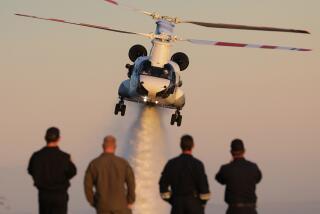Copter Aid Is Adequate, Officials Say
- Share via
A grand jury report that accuses San Bernardino County of providing inadequate air-ambulance service, putting lives at risk, drew a harsh response Monday from county officials who called the report highly misleading.
A San Bernardino County Grand Jury report released last week criticizes the county’s decision to rely on only one air-ambulance provider, concluding that the company could not effectively transport patients within the “golden hour,” the period when trauma victims can most likely be saved.
The report also suggests that the sole air-ambulance provider, Mercy Air, has received favorable treatment because of thousands of dollars in campaign contributions that the firm and its parent company had given to county supervisors.
The report specifically faulted board Chairman Bill Postmus for delays in approving a permit for a second provider, California City Fire Department’s air-ambulance service in Kern County, which currently serves as a back-up responder for some emergency calls in the county.
“When genuine concern for the safety of constituents gives way to politics, the public suffers!” the grand jury report says.
Postmus called the allegation “outrageous and untrue.” The reason for the delay was to allow county officials to review California City’s qualifications, such as response times, paramedic credentials and financial stability, he said.
“Matters of life and death depend upon the county conducting a thorough examination of these issues,” said Postmus, who promised a quick response from the board. “Public safety has not been compromised during this process.”
Other air transport firms can be called in if Mercy Air is overwhelmed. But as the only approved provider in the county, Mercy is the county’s primary responder to 911 calls. It is also used to transport patients between hospitals.
Gary McBride, the county’s interim deputy administrative officer, issued a memo to supervisors Monday saying that competition from a second responder could place a financial burden on Mercy Air. The move also might not improve response times, the memo says.
“We don’t have people out there dying on the highway because the county didn’t give a permit to California City,” county spokesman David Wert said Monday.
Since 1989, Mercy Air has provided air ambulance service to San Bernardino County, which, at 20,000 square miles, is the nation’s largest county in size. Mercy Air uses about 15 helicopters based in Southern California and Nevada and bills patients. Air transport costs from $7,000 to $12,000.
“I don’t think someone out of the county has as high of a standard of care as us,” said Mercy’s area program director, Roy Cox.
The county’s vast desert means air ambulance service is critical in remote areas, including stretches of Interstate 15 and Interstate 40. Most trauma patients are flown west, either to Arrowhead Regional Medical Center in Colton or Loma Linda University Medical Center.
Delays can occur when Mercy Air helicopters are tied up on calls and the county turns to a mutual aid provider, who might refuse to fly, said Virginia Hastings of the Inland Counties Emergency Medical Agency.
The agency oversees emergency response in Inyo, Mono and San Bernardino counties and reports to San Bernardino County supervisors.
Hastings said issuing California City a permit would allow the agency to oversee it and guarantee that the company would answer emergency calls.
According to grand jury foreman Brad Kuiper, the panel was so concerned about the air-response situation that it took the unusual step of releasing an interim report instead of waiting until the summer, when its yearlong term ends.
Members feared that without a second provider, the fast-growing county of nearly 2 million people could strain emergency resources. Their report says there were 1,819 air ambulance dispatches in 2004, a 32% increase over two years.
“Mercy Air is doing the best job they can, but they just don’t have all the helicopters we need,” Kuiper said.
More to Read
Sign up for Essential California
The most important California stories and recommendations in your inbox every morning.
You may occasionally receive promotional content from the Los Angeles Times.










